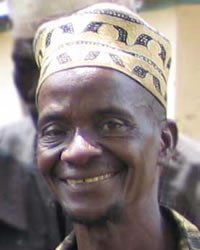The Mwera are a Bantu people group with roots in the northern part of Uganda near Lake Albert. Today the tip of their homeland touches the Indian Ocean at Kilwa Kivinje, Tanzania; moves inland with the Matumbi on their northern border and drops south to the Makonde escarpment.
The Mwera area is one of the most sparsely populated regions in Tanzania with only ten people per square kilometer. Rainfall is very light and the rivers flowing through their homeland dry up during the dry season forcing people to depend on waterholes for their normal supply of water.
"Mwera" is a word which means "those living in the mainland" far from the coast. Generally Mwera are known to be very peaceful. They live in small oval-shaped huts with grass thatched roofs. Building a Mwera house is a family project. The men cut poles for framing the house, the women gather grass for thatching the roof and the young boys dig clay used to fill in the mud walls.
Tradition dictates that certain tree species cannot be used for building houses. It seems the reason for this ban is the belief that an evil spirit would haunt such a house. The apparent benefit of the prohibition is protecting those selected trees from extinction.
The Mwera are mainly subsistence farmers with beautiful fields of maize and peanuts. Due to tsetse flies it is impossible to raise cattle. They get most of their meat from hunting and fishing. Cashew nuts are the main cash crop but marketing charcoal is good income too for those living within 20 kilometers of coastal cities.
The Mwera are a matrilineal society in which marriage requires the husband to move to the wife's premises. The children are named after the mother's brother, the maternal uncle who is responsible for important rituals and ceremonies. Both boys and girls go through traditional initiation rites which moulds their cultural identities as men and women.
Leisure time is filled with drinking tea and loitering around the shops in the market at the center of the village. It is a time to visit, play games, tell stories and take care of business.
The Mwera are an animistic people who converted to Islam when Arab slave traders came and settled in their villages. Today all villages have a mosque but rarely a church. Folk Islam provides the people with a façade but below the surface, they are very much into witchcraft and traditional African religion.
Funds and personnel tagged for research throughout the Mwera homeland to determine the need for safe drinking water. It appears this will be an automatic inroad into almost all of their villages.
Churches and individuals to focus on presenting a contextualized message of the gospel to the Mwera.
Believers to respond to the Lord's appeal for laborers among the Mwera; individuals who will live with the people, enjoy them and model a living Christian witness.
Scripture Prayers for the Mwera in Tanzania.
| Profile Source: Link Up Africa |










